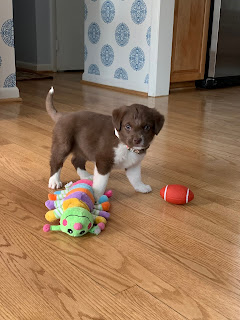Puppies like to chew on things like bones,
rubber balls, or even sticks. This puppy is chewing on somebody’s sneaker.
He will have to be scolded. Puppies are like that.
–from Puppies Are Like That by Jan
Phloog
Having a puppy is not like flying on
an airplane. Before takeoff, airline
attendants always take time to explain the emergency procedures. “Should
the cabin lose pressure, oxygen masks will drop from the overhead area. Please
place the mask over your own mouth and nose before assisting others.” In other words, take care of yourself first.
Then help others.
 Puppies aren’t like that. When they
wake up at 5:00 am, you can’t have a rational conversation with them. You can’t
say, “It’s too early—go back to bed.” They don’t understand, “Give me 5 minutes
to brew a pot of coffee and then I’ll play with you.” Puppies come first. Because if you ignore them, they will pee on
the kitchen floor and chew on the chair leg. Puppies are like that.
Puppies aren’t like that. When they
wake up at 5:00 am, you can’t have a rational conversation with them. You can’t
say, “It’s too early—go back to bed.” They don’t understand, “Give me 5 minutes
to brew a pot of coffee and then I’ll play with you.” Puppies come first. Because if you ignore them, they will pee on
the kitchen floor and chew on the chair leg. Puppies are like that.When our kids were little, we read them a board book called Puppies Are Like That. Over the last three weeks, Paul and I found ourselves echoing that refrain as we fostered a sweet six-week-old puppy named Claudette Colbert.
- All the puppies are cute
- Wolf Trap Animal Rescue provides all the supplies you need
- If you fall in love, you have priority to adopt the puppy (this is known as “foster failing.”
What more did I need to know? Sign me
up!
- Puppies may have heartworm, fleas, parvovirus or even mange
- The change in diet may mean nausea and diarrhea
- The puppy will need to be spayed or neutered
- The puppy should not be left alone for more than 4-5 hours at a time

I don’t tell you this to scare you, but to remind you of the reality that there’s a lot more to puppies than cuteness. Because pictures of puppies on Instagram tug at our emotional heartstrings. And you cannot raise a puppy on emotional “Awwws” alone. It takes blood, sweat, and tears. Literally. Furthermore, this is an important time in the life of the puppy. The socialization period occurs in puppies at approximately 3-12 weeks. In The Art of Raising A Puppy, the New Skete Monks explain, “By socialization we mean two things: first, the positive adjustment a puppy makes to the many aspects of her life, whether this includes other dogs, people, places, or objects; second, what we do to foster this.” We are caring for this puppy at the time when she is most impressionable. It’s a huge responsibility and one we are taking seriously. And by the way…She is the cutest. Puppy. Ever.
- Arrange our schedules to tag team puppy time in 4-hour increments
- Talk about poop a lot. “Did she poop?” “What time did she last poop?”
- Hire a dog sitter to come over on occasions when we were gone longer
- Bundle up in the cold darkness for early morning/late night potty breaks
- Clean up accidents in the house
- Purchase extra toys to play with the puppy
- Make sure the puppy is getting plenty of exercise
- Work on training the puppy
- Arrange for “meet and greets” so potential adopters can meet the puppy
- Read a book on how to raise a puppy
- Distract the puppy from chewing
 And oh, the puppy chewing. That’s where the blood, sweat, and tears came
in. Those puppy teeth are razor sharp! I remembered very quickly to put the electric
cords up and keep my shoes in the closet. Anything on or near the floor was
fair game. Including the carpet in my living room. Oops. Puppies are like that.
And oh, the puppy chewing. That’s where the blood, sweat, and tears came
in. Those puppy teeth are razor sharp! I remembered very quickly to put the electric
cords up and keep my shoes in the closet. Anything on or near the floor was
fair game. Including the carpet in my living room. Oops. Puppies are like that. Puppy snuggles made up for all the hard work. Even in the short time we had her, we got to see Claudette’s sweet personality emerging. She’s a smart puppy who is already crate trained and sleeping through the night. She knows “come” and “go potty” and loves to chew sticks and chase balls. She loves to be scratched behind her ears and to snuggle up next to you when she is tired. When you say her name, she gives you a little head tilt as if to respond, “Yes? I’m listening?”
Yet, as I packed up her belongings and prepared to say goodbye, I felt my throat catch and the tears well up. The house feels quiet again. Empty. We may foster again and someday, perhaps, we will get another dog. But for right now I’m excited to have a conversation with Paul that doesn’t revolve around poop.



